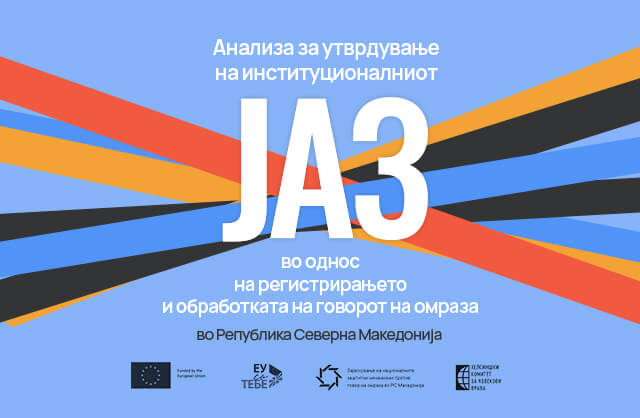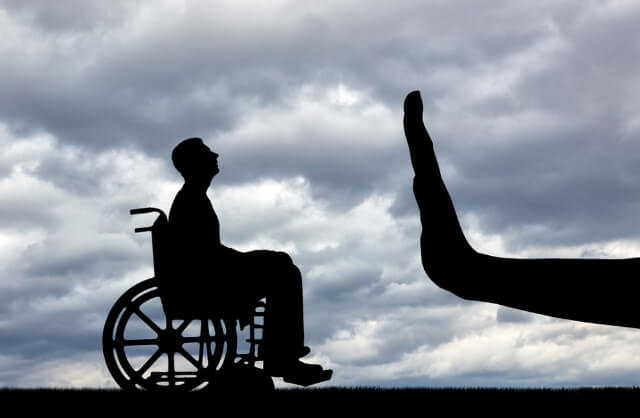ANALYSIS TO DETERMINE THE INSTITUTIONAL GAP REGARDING THE REGISTRATION AND PROCESSING OF HATE SPEECH IN THE REPUBLIC OF NORTH MACEDONIA
October 12, 2023

The beautiful word seduces a person. On the contrary, the ugly word, and what’s more, an untrue one, arouses unrest and conflicts. Man is a group being, and he proves it through the fact that he does not tolerate solitude (and is even afraid of it); the fact that he is more sensitive to the clamour of the crowd than to any other sound, and the fact that he is very sensitive to the leader of the pack, but also to the opinion of his fellows. Even in the case of religious ascetics and hermits, they cannot be said to have isolated themselves in solitude because by doing do they believe they will communicate with someone else – with their deity. What is innate in man, as well as in a large number of animals, is the system of communication or speech, and it can only be practiced in a group of the same species.[1]
Freedom of speech as a fundamental democratic quality implies speech – literally but also the freedom of expression, writing, and publication. By definition, freedom is the social capacity to act, to move in any direction, to behave in accordance with as many alternatives as society allows, and yet to remain just. It can be said that society is the best when it provides the greatest number of alternatives.[2]
Freedom is limited by the deprivation of inner feelings, the lack of affection in childhood and youth, sexual or political repression, and punishments without foundation. All those factors reduce the alternatives. Although it is said that liberties are innate and rights are acquired, without adequate penal treatment, freedom becomes endangered. And it is the individual freedom that is being threatened at first, and then – the social freedom since the essence of freedom is in the human entirety and its totality.
A free society is one that does not argue about the problem of freedom but allows free action and speech.[3] But that freedom can be abused. Then comes the hate speech. After considering the constellation between freedom of speech as a fundamental human right and legislative restrictions on hate speech, it is clear that for these two categories the common denominator “speech” is only apparent. It is not a question of synonyms or homonyms. These are completely different spheres that touch in competition. Expressed allegorically, it can be said that the fire is also alive because it has “living” flames, but it does not represent – life. On the contrary, it means destruction. Well, that’s exactly how things are set up between freedom of speech and hate speech, which in this case would be equated with fire.
In the context of Southeast Europe, these have a direct influence on the crime of hate speech: nationalism, geopolitical significance, strategic foreign propaganda, and political tension. This is a region where different religions meet, but also different mentalities (European rationalism versus Mediterranean nonchalance), natural climates (Mediterranean versus continental), but also science and empiricism versus superstition and mythology. The peninsula is a geographic key to three continents.
It is a complex political microcosm[4] with unpredictable politics. However, it is curious that according to some relevant research, racism is the least visible in the republics that emerged from former Yugoslavia compared to the rest of Europe,[5] and Croatia[6] is considered the least “Islamophobic”.[7] But unfortunately, hate speech covers a wider range of protected categories, including ethnicity, religion, and political affiliation.
Here, in relation to Macedonia, it is enough to say that a few years ago news broke out that we were “bombarded” with hate speech.[8] Theoretically, hate speech is still a grey area due to disagreements and controversies about the definition and its scope. Therefore, in practice, this term still does not have its own firm definition before international organizations. Anyone can be a victim of hate speech crime, although members of minority communities are the most common victims.[9]
In this paper, an attempt will be made to answer the complex question of building a strategy – a systemic response to the prevention and sanctioning of hate speech in both traditional media and “online” media. In particular, criminalistic “ground” aspects are elaborated, which should be taken into account when building that strategy. But in order to create an effective response, the phenomenon and its quantity should be well-known beforehand. On the contrary, the response will be mild, watered down, and the hate speech will take on mythical proportions.
That is why statistics are needed as a tool. In order to register and process hate speech, if elementary statistical processing is taken into consideration, there should first be an appropriate and favourable legislative reality in the state that will authorize officials to register the data they come across while working in those state authorities that have the authority to fight against hate speech as a phenomenon.
Then, according to the positive legal regulations for administrative work and archiving, every state authority has the duty to take care of this data and, if the state needs it, to channel it into one centre. Ultima ratio as far as “processing” is understood in the sense of acting and fighting against such crimes and if there is a favourable legislative climate for that as well, in that case these officials should not remain passive and only register, but should act preventively or repressively, according to the Law. It is these things that will be discussed in this analysis.


